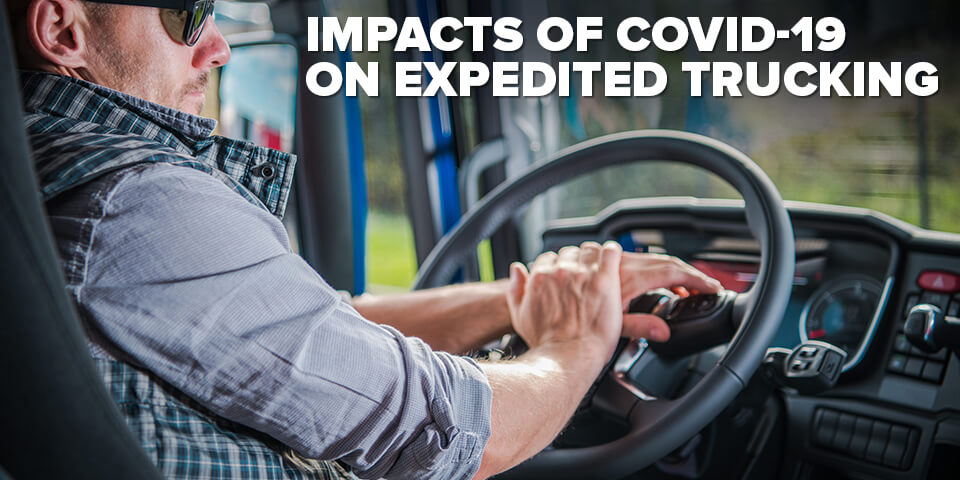
Impacts of COVID-19 on Expedited Trucking
As of this writing, the COVID-19 (also known as the coronavirus) pandemic has ground much of the U.S.-and global-economy to a halt.
Several states have issued full lock-down orders, causing most businesses to close except those deemed as essential services, such as healthcare facilities, grocery stores, pharmacies, and transportation companies. Many restaurants are still open but only for take-out or delivery.
And last week, most automakers announced plant shutdowns for the foreseeable future.
These are uncharted waters for many industries, including expedited trucking.
So, what are some of the impacts on expediting? What can you expect to see in the coming weeks?
I reached out to four industry veterans to get their outlook and any advice they might have on how to navigate these uncertain times. Here's what they had to say.
John Elliott, CEO at Load One
Impact: "The [automotive] plants are just starting to shut down, so the effects are only beginning to be felt. There will be a ripple effect from the suppliers on down. I think that a few days from now, we will see a significant drop in expedited manufacturing freight in the country. As a carrier, we see an uptick in some other customers. We do work in the healthcare industry, and that area is surging. I am not sure if [that surge] will offset the downturn in manufacturing, but it all depends on how this virus grows or doesn't, and how long manufacturers stay idle."
Advice: "Be patient. It's a historic time for the country and your carrier. Hopefully, you are with a carrier that has a real sales team and is not heavily reliant on automotive bid board freight. If you are thinking of moving carriers, sometimes doing it during a slow period may make more sense."
Dave Corfman, fleet owner
Impact: "So far so good, but we are anticipating a slow down once things stabilize. We don't do a ton of auto freight, but competitors do, so when their freight dries up, everyone is in the same sandbox. A lot of sports and entertainment have also stopped, so that will affect some expediters. We are involved in that freight, so you need loads to replace that. Relief loads seem to be those loads currently. With teams and drivers out there, you're always on pins and needles for their health and safety, especially since this is uncharted territory. [Further] restrictions and closures will add challenges for sure."
Advice: "This is another reason you don't want to be undercapitalized. Crazy stuff comes up. Who would have thought a virus?"
Greg Huggins, solo owner-operator
Impact: "Personally, I am running almost business as usual. Contacting my customers directly to confirm dates and times has always been my standard operating procedure (SOP). However, I do reconfirm more than before. Having supplies on the truck to sustain a week or two is an SOP. And cleaning and sanitizing my truck has also always been an SOP."
Advice: "The best advice I can give anyone in the transportation industry is to remain in constant contact with shippers and receivers. Daily changes are currently affecting businesses, and we have to be as proactive as possible with communication. Do not assume the load is still available or that the receiver is still open at full capacity. Call customers and confirm before pick up, during the trip and before delivery. And be prepared for unusual interactions with customers, such as health questions or barred entry to facilities for non-employees."
Linda and Bob Caffee, team owner-operators
Impact: Linda: "One concern, as businesses keep shutting down, is the trickle effect. Where are we going to be in two weeks if everything keeps shutting down? I'm thankful we are in the financial position we are in."
Bob: "A big challenge right now is getting loaded or unloaded. I saw a post [on social media] where a driver picked up a load, but when he got to deliver it, there was no one there to receive it, even though this was a 24-hour facility. He called the agent who said that the receiver was having to find people who were willing to go into work and that it may be two to three days before he can unload the truck. If that driver is not equipped like we are with food and shower and toilet on the truck, he could be in a bad place. He's also taken out of a revenue stream, still sitting in a location where there are no facilities and not getting paid to hold that freight. So, even if there is higher demand [for expedited freight], you're not guaranteed there will be someone on the other end."
Advice: Linda: "I think it is going to be more up to us [as owner-operators and drivers] to be proactive with the shipper and reach out to them, saying, 'I'm sorry I'm bugging you. But I know things change fast right now.' I really believe that we have to ensure that the business is going to be open before arriving to pick or deliver the load. Also, it's good to network with people on what's going on. But if they're Negative Nellys, I think you need to let them go right now."
